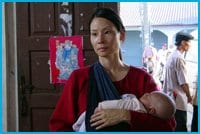Three nuns brimming with evangelical fervour journey to Africa. An illegal blood trafficker in Asia wrestles with her conscience. A mother confronts despair with determination and unexpected guile. These are the stories of Three Needles, a new film by Canadian director Thom Fitzgerald (Hanging Garden, Wild Dogs), screening at the Toronto International Film Festival this month.
“I think of this more as a disaster movie than an AIDS movie,” says Fitzgerald. “This is a movie about people who make what they believe to be a tiny sacrifice, and that tiny sacrifice leads to their entire world and identity changing.”
Clara (Chloë Sevigny) is a novice nun who travels to South Africa with sisters Hilde Francis (Olympia Dukakis) and Mary John (Sandra Oh). The trio set up camp in a village devastated by AIDS, tending to the dying and attempting to convert as many as possible to Christianity. Clara immerses herself in the villagers’ daily struggle for life, negotiating for help with the local white employer and trying to make a practical difference in the lives of a family of orphaned children.
In the continent next door, blood trafficking means big money in China. Small villages welcome Jin Ping’s (Lucy Liu) mobile blood collection service and the money they can make by donating blood. Unfortunately, the equipment used is not sterilized properly and the ensuing epidemic leads one village’s lone, uninfected husband and father (Tanabadee Chokpikultong) to search for answers.
Meanwhile, a half-a-world away in Montreal, Olive (Stockard Channing) is reeling from a double whammy: finding her ailing husband dead after a long shift waiting tables and stumbling onto graphic video evidence of her son’s career as a porn star. Denny (Shawn Ashmore) is devoted to his mother, helping out with his illicit paycheque and trying to shield her from his true vocation and precarious health.
In the film, each of these stories unfolds gradually. “I have to approach each character from the point of view of liking them or understanding them,” Fitzgerald says, “not judging them.”
Filming a story with such disparate plot lines and locations proved challenging but unexpected moments greatly inspired the often flabbergasted writer and director. While shooting the opening scenes, for example, a group of South African boys passed by en route to their circumcision ritual. The gathered extras, all from local villages, added an unplanned element of grace.
“They have their song that they sing when boys go to get circumcised,” Fitzgerald says, still marvelling at what he was able to capture on film. “I had no idea that 200 people would break into their ‘go-get-circumcised’ song…. It was incredible.”
Local talent figures largely in the cast, with an elderly villager performing in an important role. “Mabel [Adams] just came in and gave the best audition. The reason she was so good was that her daughter had died of AIDS. So when Mabel cries [over her screen daughter’s demise], she really cries. She didn’t stop crying when we said, ‘Cut.’
“I was awakened to how starkly different people’s lives are. To be an 80-year-old woman who lives her whole life in a hut made of cow poop. She’s never seen a television or a movie, and here she is starring in one.”
It was a bittersweet epiphany for the Halifax resident, viewing the ravages of history. “They’re dying out for a variety of reasons: culturally, because we’re inflicting our culture upon them, and they’re also literally dropping dead. We’ve captured something on film that won’t exist in 30 years.
“I’m sure I will look back upon it as one of the great adventures of my lifetime.”

 Why you can trust Xtra
Why you can trust Xtra


